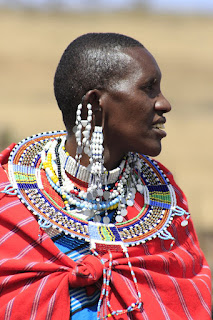
Yesterday was the longest drive of
the trip...the back-breaker ride aka the Masaai massage. The two cars
drove from our north Serengeti camp to the south-central Lake Manyara area. In
the afternoon we stopped off at a Masai village or Boma and indulged in a
wonderful organized photography session with the Masaai in their traditional
attire, in and around their traditional dwellings and with their families.
Prior to arriving here Ali had coached us in the most favourable camera
settings and compositions for the portrait photography of the Masaai. The light
was bright because it was midday and the strong winter sun cracked down on all
features, human and geographical. Black and white maybe the best to view these
photographs, Ali surmised.
By nightfall we had arrived at the
Manyara Safari Wildlife camp which is another impressive, sprawling estate of
independent thatched (hotel) dwellings scattered on the rim atop Lake Manyara
and connected by well-lit walkways to the main hub. We had dinner at this beautiful
lounge over the lake and watched a few local entertainers sing and dance on the
patio. That evening, at the invitation of our tour leader,activists activists
from the PAMS foundation spoke to us about their elephant conservation efforts
in Tanzania and how their techniques are credited with finally turning the tide
against poachers. On behalf of Fairtrade Safaris, our amazing tour organizers
and operators, PAMS was presented with a $4000 gift to promote their
conservation work.





A good night's sleep later we
pack-up and head-out toward the town of Arusha about 120km away. The drive is
uninteresting to me because oddly enough the roadside villages, businesses and
shops look very much like those in India. The big difference is that even this
remote, rural Tanzania is a much cleaner country, with less litter and garbage
strew around human settlements and roadways. Bathrooms at any and every stop
along the two week trip have been clean and usable, unlike their counterparts
in India where I grew up and traveled much. It is indeed a happy surprise to
find the ethic of cleanliness not just stated but manifested in daily life.
We will arrive at this 5-star resort Serena Hotel in Lake Duluti and as we drive the last few miles to the security gate I wonder why the road leading to such a rich international resort is unpaved and in such poor condition. How is it that international conglomerates are able to make huge investments in hotels and resorts such as these while ignoring the surrounding infrastructure and people? These businesses with their running hot water and foreign cuisine stand in sharp contrast to the poverty, shambles and disintegration all around them?
We will arrive at this 5-star resort Serena Hotel in Lake Duluti and as we drive the last few miles to the security gate I wonder why the road leading to such a rich international resort is unpaved and in such poor condition. How is it that international conglomerates are able to make huge investments in hotels and resorts such as these while ignoring the surrounding infrastructure and people? These businesses with their running hot water and foreign cuisine stand in sharp contrast to the poverty, shambles and disintegration all around them?
The visit to
the Masai Boma yesterday was billed as an educational visit to an old
culture and people. I anticipated that my years and experience blending
(albeit briefly) with the wisdom and way of the Masai would yield some
insights useful to my life and spirituality I think I was disappointed. I
think, because I am not sure of of this…but I do feel strongly so I am
writing thus…
Our
visit was very transactional, opportunistic and deeply capitalistic
in its nature. As photographers we were looking to capture the deeply
contoured old Masai faces against the colorful red fabric, the children
with flies settled upon their faces, and Masai women against the backdrop of the cow dung huts. We did do this but it was without focus. Young Masai men speaking fluent English and expertly directing our movements, ordering their companions to pose or remove themselves from photographs and offering everything from handcrafted jewellery to a buffalo's blood-letting for a price seemed to indicate to my discomfort that this culture sale was good business.




No comments:
Post a Comment